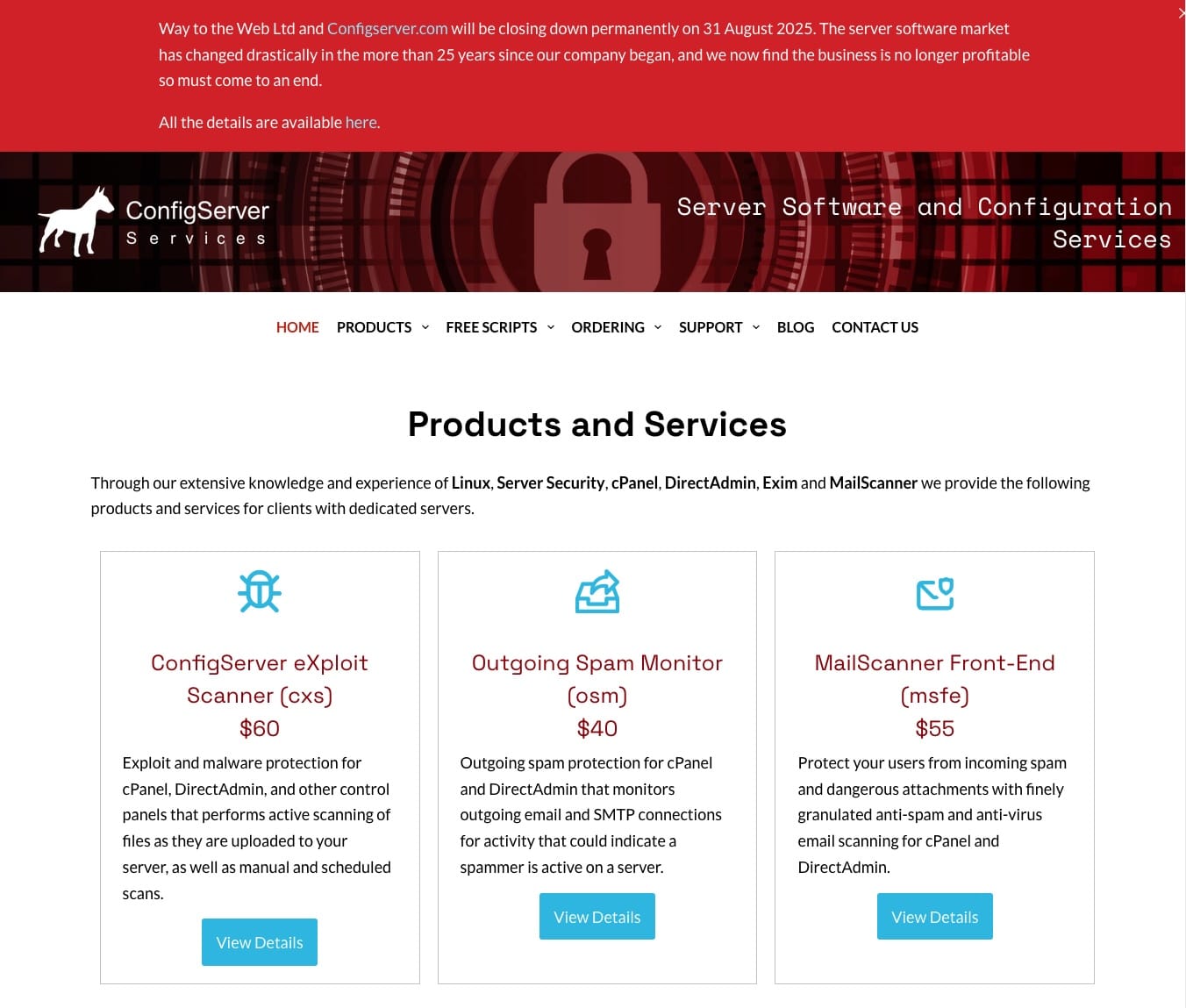After more than two decades of operation, ConfigServer.com will cease all activity, including technical support, downloads, and licensing. The technical community is facing a significant void in the open-source cybersecurity tools ecosystem.
ConfigServer, one of the longstanding companies in security software development for Linux servers, has announced that it will definitively shut down on August 31, 2025. The announcement, made on their official website, affects both their commercial products and their suite of free tools, notably ConfigServer Security & Firewall (CSF), considered for years a standard on cPanel, DirectAdmin, and other panel-managed servers.
The closure is final: starting on that date, support will no longer be available, installers cannot be downloaded, and license management systems will stop functioning, which means some products will cease to operate even if installed.
Products affected include:
– ConfigServer Exploit Scanner (cxs)
– MailScanner Front-End (MSFE)
– Outgoing Spam Monitor (osm)
– ConfigServer Security & Firewall (csf)
– ConfigServer Mail Queues (cmq)
– ConfigServer Mail Manage (cmm)
– ConfigServer ModSecurity Control (cmc)
– ConfigServer Explorer (cse)
For the commercial products (cxs, osm, and msfe), if they are not updated to their latest versions before the shutdown, they will cease to function entirely, since they depend on activation servers that will be disconnected on August 31. Additionally, after that date, reinstalling or transferring licenses to other servers will not be possible, even if recently purchased.
Regarding CSF and other free tools, while existing installations might continue to function, they will not be updated or available for re-download. However, the company has announced plans to publish the CSF source code under the GPLv3 license on GitHub before shutting down, allowing the community to continue its development independently.
This announcement has sparked intense discussions in forums such as DirectAdmin, where experienced users are evaluating alternatives like UFW, Fail2ban, or even creating private repositories to continue installing CSF on new systems, provided original files are preserved. Nonetheless, there are limitations: CSF is not compatible with newer systems like AlmaLinux 10 or RHEL 10, which may prompt a quicker shift to more modern solutions based on nftables.
Security experts have highlighted a lesser-known risk: if the domain configserver.com becomes inactive after its expiration in 2027 and is acquired by malicious actors, servers still querying download.configserver.com or download2.configserver.com could be manipulated to execute malicious code. Therefore, it’s recommended to modify the /etc/csf/downloadservers file to point to a repository controlled by the system administrator.
Additionally, disabling automatic updates for CSF is advised by removing the related cron entry (/etc/cron.d/csf_update) or disabling it directly in the configuration file (AUTO_UPDATES = “0”).
According to the official statement, the closure reflects a radical change in the server software market. “The market has changed dramatically since we started over 25 years ago, and the business is no longer profitable,” admitted ConfigServer. The lack of recent updates and forum activity had already raised doubts within the community, which now finds its fears confirmed.
For those relying on these tools in production environments, the deadline of August 31 presents a critical countdown to decide: upgrade, migrate, or replace systems. The future of CSF and other scripts will largely depend on the open-source community’s willingness to continue their legacy.
In any case, the shutdown of ConfigServer marks a significant turning point for thousands of professionals worldwide who have trusted their solutions for server security for decades. Transitioning to new tools will be inevitable, but the impact of this closure will resonate in the Linux ecosystem for a long time.

